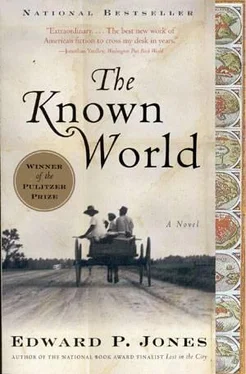Henry continued to scream until Robbins reached him and told him to be quiet. “Stop that! Stop that, I say!”
“But she dead,” Henry said, looking around Robbins and pointing at the still Philomena.
“She ain’t no more dead than you or me.” Robbins held him gently by the throat. “Now hush that ruckus.” Robbins went back to Philomena and Henry followed him. The man sat on the bed and held Philomena and shook her, and with each moment, the sickening subsided. Henry watched and said nothing. “Go find them children,” Robbins said. “In the next room. Go find em and see to em.” He watched Henry leave and wished he had not told him to go. I am in this nigger house, he thought, surrounded by niggers. He watched the pulsing vein in her neck, counting the beats. When the number was nearing 75, he closed his eyes but went on counting.
Henry did not see the partly opened door to the left leading to the room where the children were. He went out into the hall to the right, never thought to knock and simply pushed open the door and saw only darkness. He did not sense that the children were there and went to the door on the other side of Philomena’s room and opened that door. Dora and Louis were in the bed and the girl was holding her brother. They had heard their mother shouting and then their father shouting and then they had heard Henry screaming.
He went to them and told them everything would be fine and, within a few minutes, they began to believe him. He had made their shoes, which were in a little pile in the corner. He gave them water and they drank as if it were the first in a very long time. This was the beginning of why Louis would get down into the hole without a second thought and dig for some while to help make Henry’s grave. Without even knowing why, Henry began to sing to them and gradually Dora was able to let go of her brother.
Robbins found Henry kneeling beside the bed, still singing. Henry had found a piece of string from somewhere and with the string he was making and unmaking Jacob’s Ladder, the one thing Rita, his second mother, had known how to do with string.
“I’m just a little somebody and I don’t care a bit,” he kept singing. “I’m just a little somebody and I don’t care. A little somebody…” Robbins stood in the doorway and listened. “I’m just a little somebody and I don’t care a bit.” He wondered if his wife back home was asleep. Someone across the hall laughed and he remembered the laugh from a slave working in his fields. Robbins touched the door with his fist and watched it open wide and then wider.
Dora saw him first and bounded out of the bed and into his arms. He kissed her cheek. She held on to him until he took her back to the bed and put her down. He touched Louis’s cheek, but the boy did not respond because Henry had given him the string and that was all the little boy knew for that moment.
“I want you to stay with em tonight, Henry,” Robbins said, pulling the covers up to Dora’s neck and blowing out the lamp on her side of the bed. “Stay with em and keep em peaceful. Just stay with em.”
“Yessir.”
He went to Louis’s side of the bed and laid him down and pulled the covers up to his neck. “Yall listen to Henry,” he told them. He took a few blankets piled on a chair and told Henry to lie beside the bed, and Henry took off the shoes he himself had made and he lay down and Robbins blew out the candle at Louis’s side of the bed and left the room.
The owners of the boardinghouse were with Philomena when he returned to her room. The side of her face was bloating, turning purple with each moment, but he didn’t know what color it was because the lamp on that side of the room had gone out. “I want somebody to attend to that,” Robbins said to the husband and then repeated himself to the wife, nodding all the while in the direction of the injury. “We will,” the woman said. “We will,” the husband said. He went to the bed and thought for the first time that what he felt for Philomena might well doom him. His wife liked to retire early, but his daughter would stay on in the parlor to read or to keep up with her correspondence. The downstairs of his mansion his daughter called the South and the upstairs she called the North. “Go to the East, Mama,” Patience, the daughter, would say years later on that day Dora came to the mansion. It was the day Patience thought William Robbins was near death. “Go to the East and I will seek you out there. Please, Mama. Please, sweetheart.” Dora would be standing in the mansion doorway. The two daughters had never seen each other before that day. “Go to the East and I will seek you out, Mama.”
Robbins knew Philomena would not be able to travel in the morning and he decided then that he would have to leave her. And he did not want his children to see her face. He told the boardinghouse owners that he wanted to see that Philomena got back to Manchester. “I see to it,” the man said. “I got somebody and we see to it.” Robbins had no faith in the man’s word but it would have to do. “She be ready in a day or two,” the woman said, holding Philomena’s chin and inspecting the injury. Even as they all spoke and the man and the wife tried to assure him that they would bring Philomena to him, he began to fear that he would not see her again. He looked at her and could not take his eyes from her. He hoped that her love for their children would compel her back to Manchester. He dared not hope that any love for him would do it.
He went back to the white hotel he had registered in earlier and drank a good bit, though that had not been his intention when he first entered the Negro boardinghouse. He awoke about eight, later than he would have liked, and returned with his horse to the boardinghouse and was surprised to see that Henry had already made arrangements for the trip. He had secured a surrey for himself and the two children and for Philomena, since he had not known that she would not be returning with them. The surrey would be pulled by the horse Henry came in on and another horse he had gotten from a stable nearby, using the name of William Robbins as currency because he had come to Richmond with little money of his own. After seeing to Philomena, Robbins found the children in their room, fed and rested and full of giggles. He took them to Philomena, for the swelling in her cheek had subsided, and then he took them out and down to the carriage. Philomena slept through their visit.
They left for Manchester near about ten o’clock. At five that day they stopped at a house close to Appomattox, about halfway to their destination, and at that house they stayed the night. The owner of the house, a white man of forty-nine then married to his fourth wife, who was the sister of his dead second wife, was used to much traffic on the road, had made a good life catering to it. He knew Robbins well enough to let him keep three Negroes in the room next to Robbins and he didn’t charge him any extra for having Negroes in the place and not in the barn.
Henry drove the surrey the whole way to Manchester, Louis beside him and Dora in the back, a cloth doll for company, and for a good bit of the way Robbins rode Sir Guilderham beside them. Once, way on the other side of Appomattox, Dora looked out and up at him. He smiled at her and then, after about half a mile, told Henry to stop and he tied the horse to the back of the carriage and he got in with Dora and she moved without words into his arms. Robbins looked at the back of Henry’s head, at the way Louis watched him, as if this was all a lesson he would later be tested on. Dora dozed and Robbins thought that this would be a good way for him to die, right there, on the road home with his children. The only thing to make it better would be to have his daughter Patience on the other side of him. Looking at the back of Henry absorbed in his work, it came to him like something he had long been avoiding, that the world would not be very good to the children he had had with Philomena, but whatever world it would be, he wanted Henry in it for them.
Читать дальше












